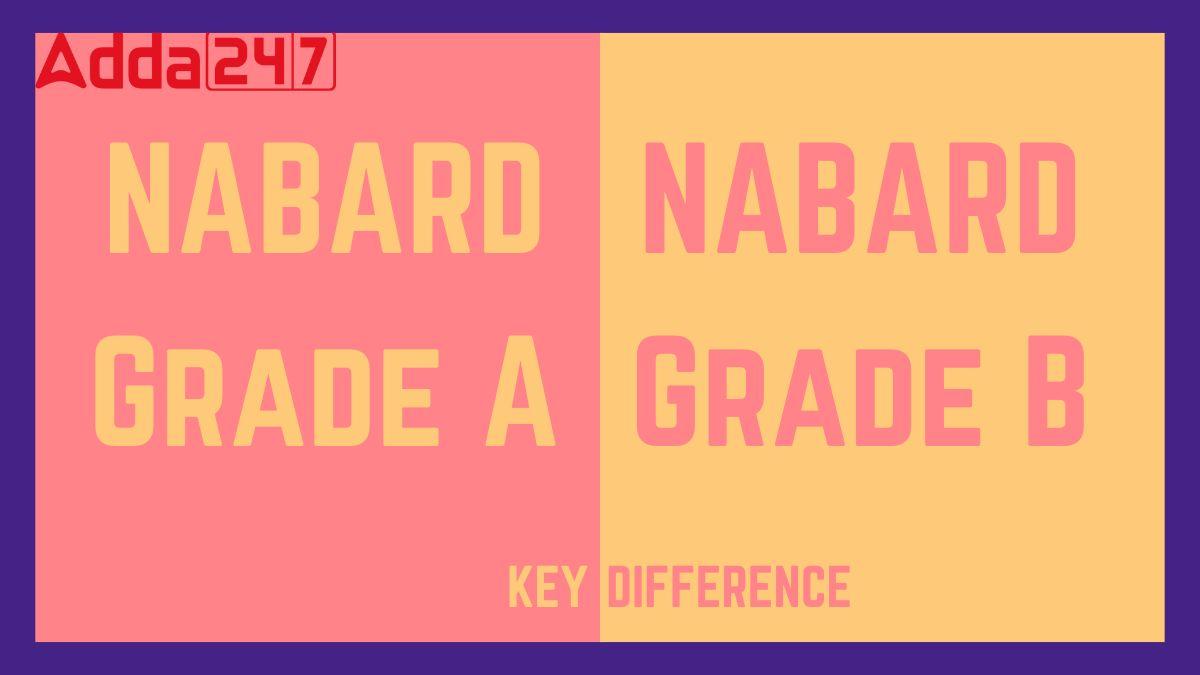Table of Contents
Want to know about NABARD Grade A and NABARD Grade B posts? Go nowhere as we will provide you the all the knowledge related to these. The highest authority on agricultural and rural development in India, NABARD, provides career chances for those with a range of backgrounds and goals through its Grade A and Grade B posts. Grade A jobs, sometimes called Assistant Managers, are the first step into NABARD’s managerial hierarchy, whereas Grade B jobs, or Managers, are the next step up in terms of authority and knowledge. These positions are essential to the nation’s ability to finance agriculture, develop rural areas, and carry out policies.
Aspiring candidates hoping to use NABARD to push India’s agricultural and rural development agenda must be aware of the differences between Grade A and Grade B posts. Check the following article to know the key differences between both posts.
NABARD Grade A and Grade B
NABARD provides applicants with the opportunity to carefully oversee the supervision of all regional banks as the leading cooperative banks in the country. Therefore, receiving a selection for an exam like the NABARD Grade A and Grade B causes immense joy for a lot of people in this country. Despite the prestige that comes with it, passing the NABARD Grade exams requires a great deal of focus, preparation, and work, making it challenging to get recruited at one of the top banks.
NABARD Grade A
NABARD, The National Bank for Agriculture and Rural Development conducts an exam for GRADE A for the post of Assistant Manager in different fields such as Rural Development Banking Service, Rajya Sabha Service, Legal Service, Protocol and Security Service. The candidates with the necessary skills and knowledge are selected through this exam. The NABARD Grade A exam comprises three different stages including prelims, mains, and interview. The Aspirants who clear all three stages of the exam are appointed as the Assistant managers in NABARD.
NABARD Grade B
The National Bank for Agriculture and Rural Development (NABARD) also conducts an exam for the post of GRADE B. The selected candidates for the Grade B post are appointed as Managers in NABARD in different fields. This exam also of three stages which include prelims, mains, and interview. After clearing all three stages candidates will be appointed as managers.
NABARD Grade A vs NABARD Grade B: The Key Differences
For more details check the table below:
| NABARD Grade A vs NABARD Grade B: The Key Differences | ||
| Topics | NABARD Grade A | NABARD Grade B |
| Position | Assistant Manager | Manager |
| Selection Process | 3 Stage Process
|
3 Stage Process
|
| Exam Difficulty Level | Easy to Moderate | Easy to Moderate |
| Job Profile |
|
|
| Salary and Perks | Basic salary of Rs.28150/- p.m | Basic salary of 35150/- p.m |
| Age Limit | 21-30 | 21-35 |
| Educational Qualification | Graduate Degree from an authorized University with a minimum of 50% marks in any stream. Or, Chartered Accountant /Cost Accountant / Company Secretary with a Bachelor’s degree. Or, Full-time MBA degree or P.G. Diploma in Management. Learn more about educational requirements for Specialist Officers. |
Graduate Degree from any authorized University with a minimum of 60% in any stream. |
| Papers | Phase 1- 200 mark paper to be solved in 120 minutes. Phase 2- Paper 1- 100 mark paper to be solved in 90 minutes. Paper 2- 100 mark paper to be solved in 90 minutes. Interview- 25 marks |
Phase 1- 200 mark paper to be solved in 120 minutes. Phase 2- Paper 1- 100 mark paper to be solved in 90 minutes. Paper 2- 100 mark paper to be solved in 90 minutes. Paper 3- 100 mark paper to be solved in 90 minutes. Interview– 40 marks |
| Syllabus | Phase 1
Phase 2
|
Phase 1
Phase 2
|
| Articles Related To NABARD Grade A Exam 2024 | |
| How to prepare for NABARD Grade A | NABARD Grade A Books |
| NABARD Grade A v/s NABARD Grade B | NABARD Grade A v/s RBI Grade B |
| NABARD Grade A v/s SBI PO | Does NABARD Grade A get home posting? |




 RPSC Agriculture Officer Admit Card 2025...
RPSC Agriculture Officer Admit Card 2025...
 ASRB NET Syllabus 2025, Check Detailed S...
ASRB NET Syllabus 2025, Check Detailed S...
 BSSC Field Assistant Recruitment 2025 No...
BSSC Field Assistant Recruitment 2025 No...


 Adda247 Job portal has complete information about all Sarkari Jobs and Naukri Alerts, its latest recruitment notifications, from all state and national level jobs and their updates.
Adda247 Job portal has complete information about all Sarkari Jobs and Naukri Alerts, its latest recruitment notifications, from all state and national level jobs and their updates.